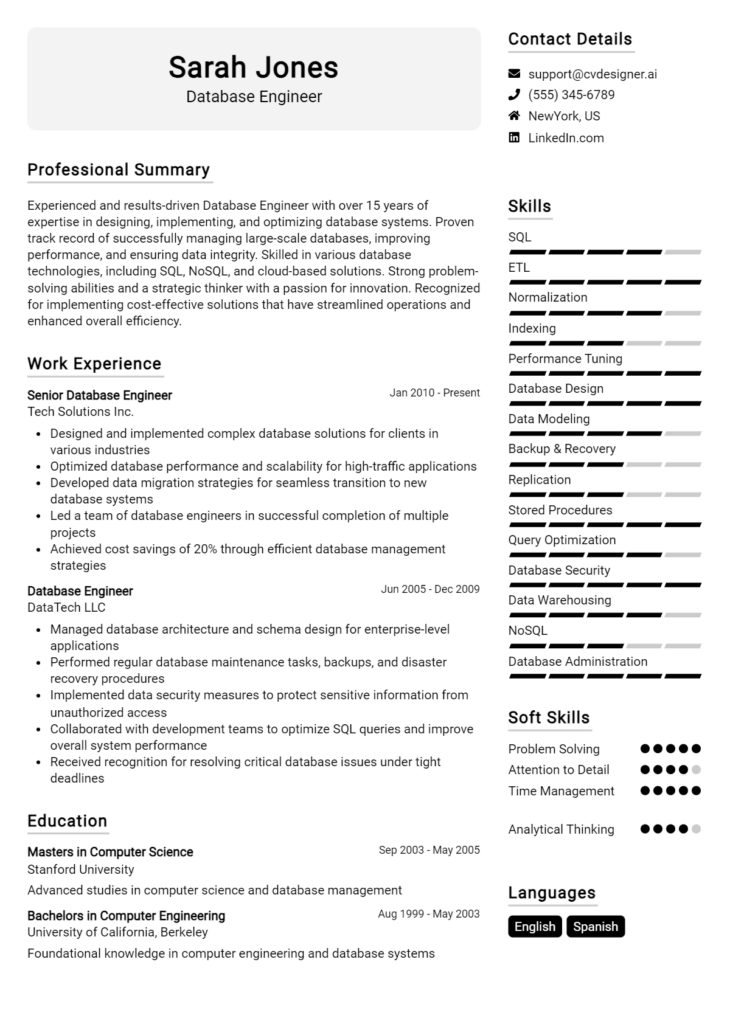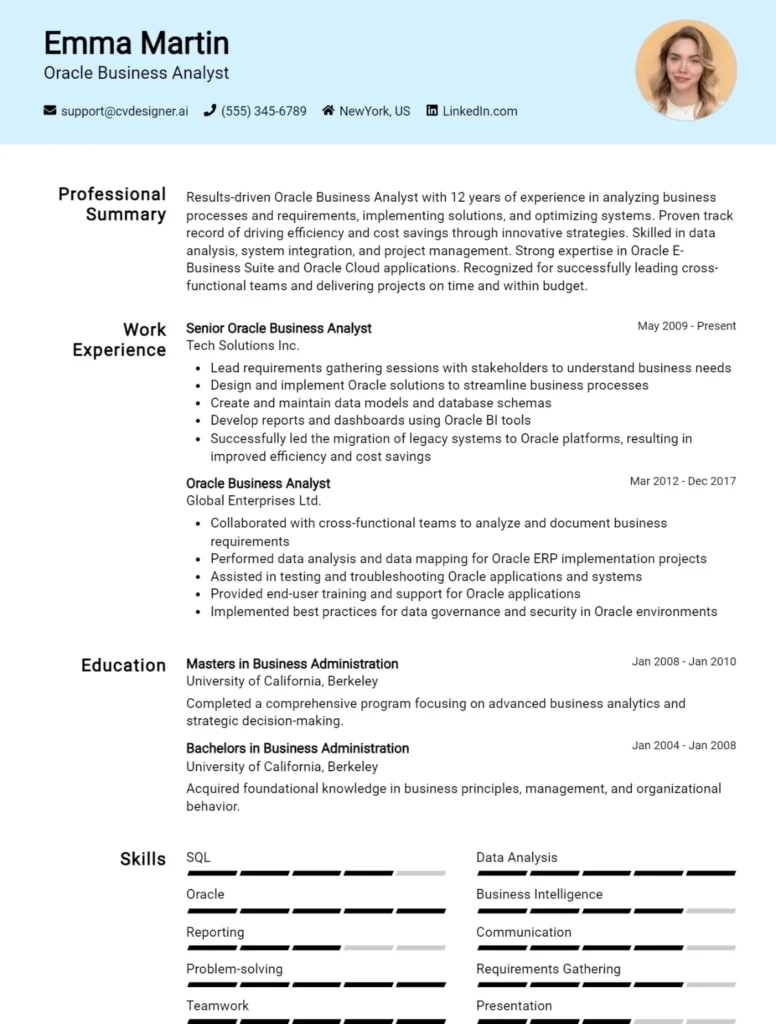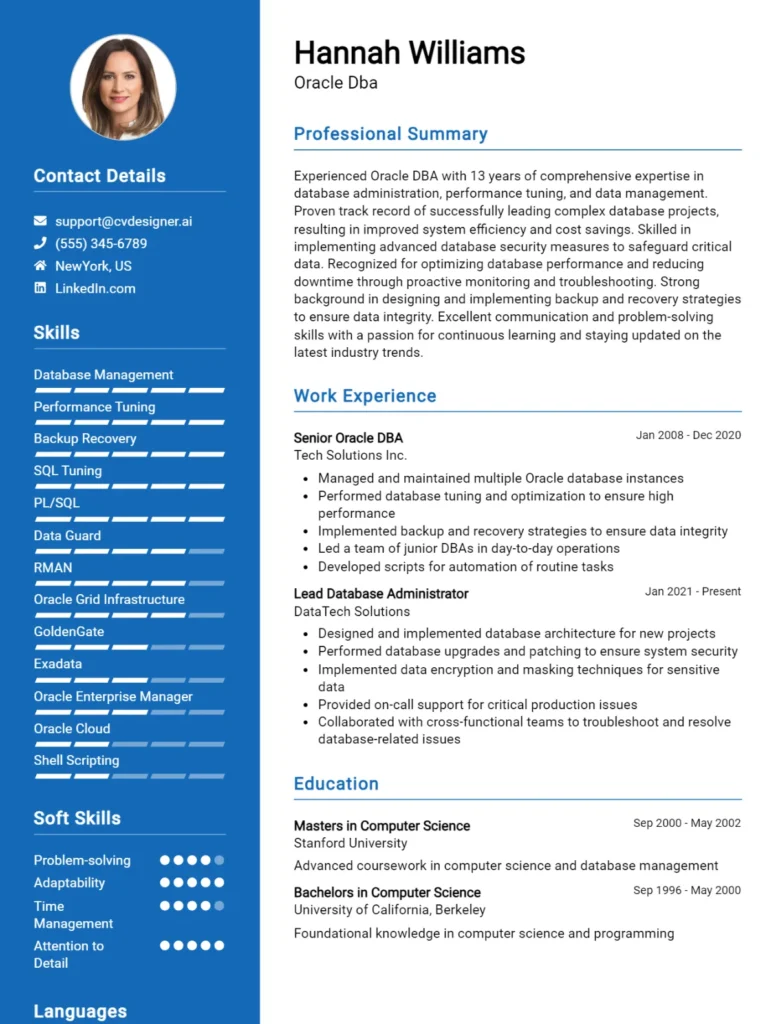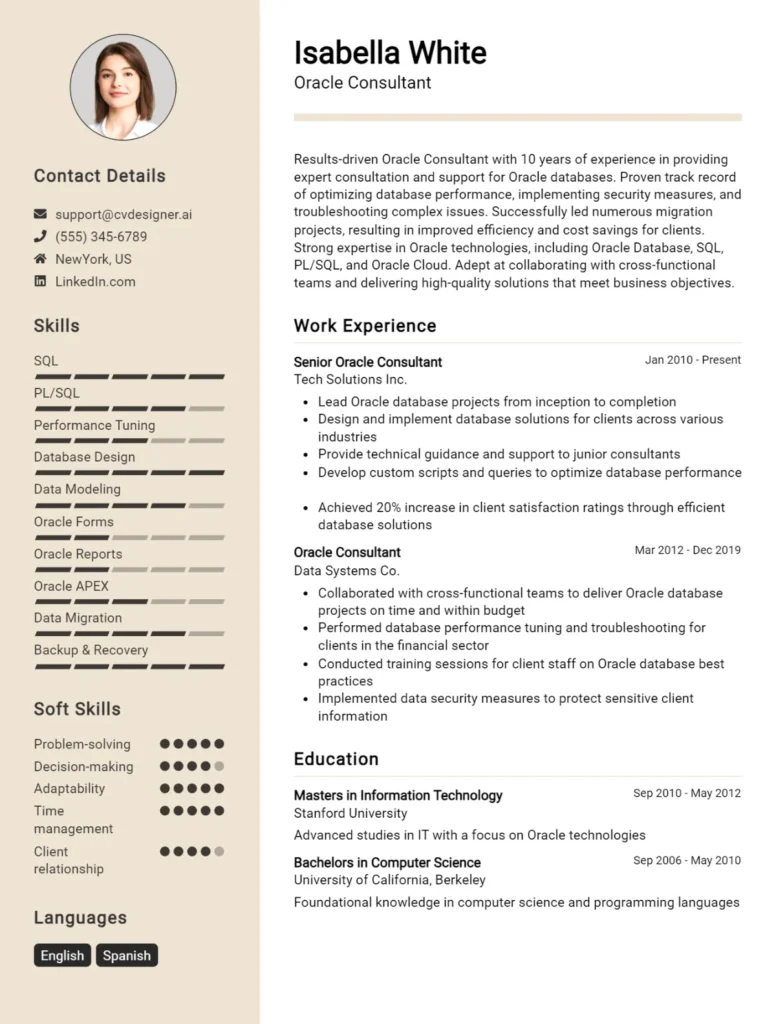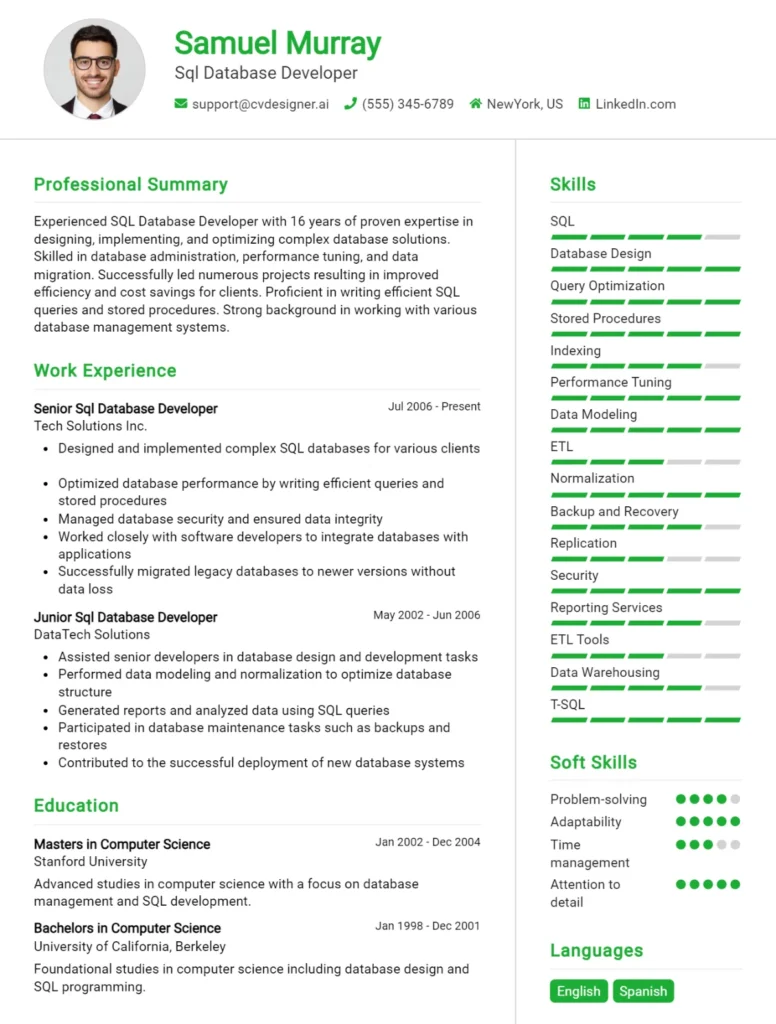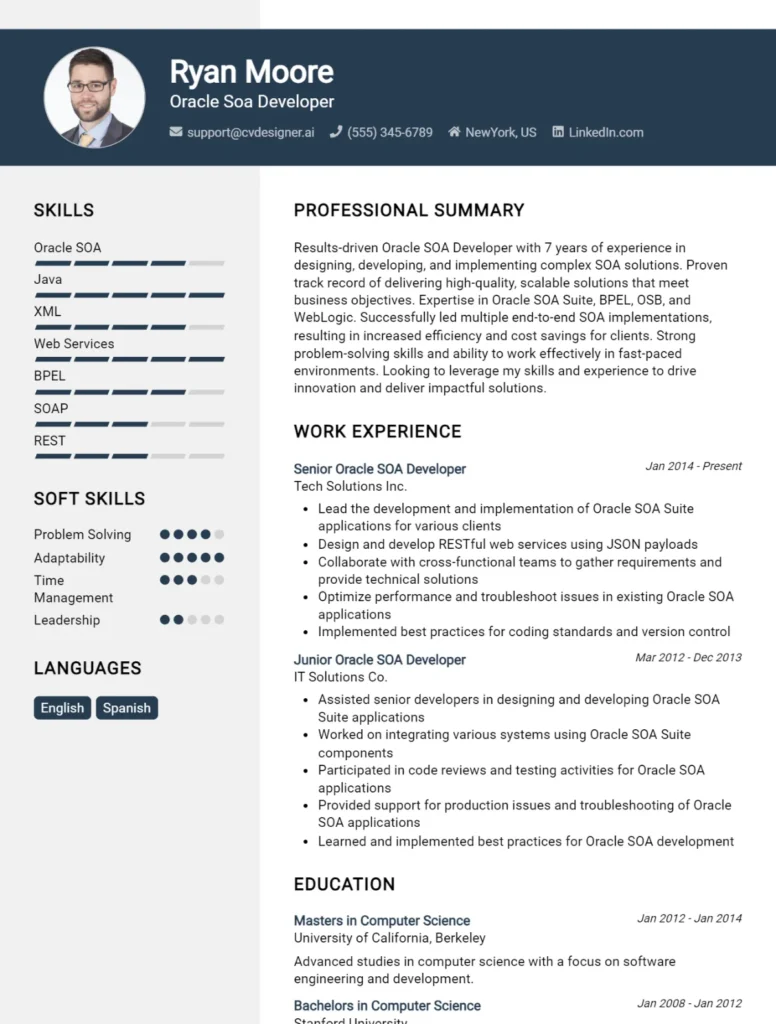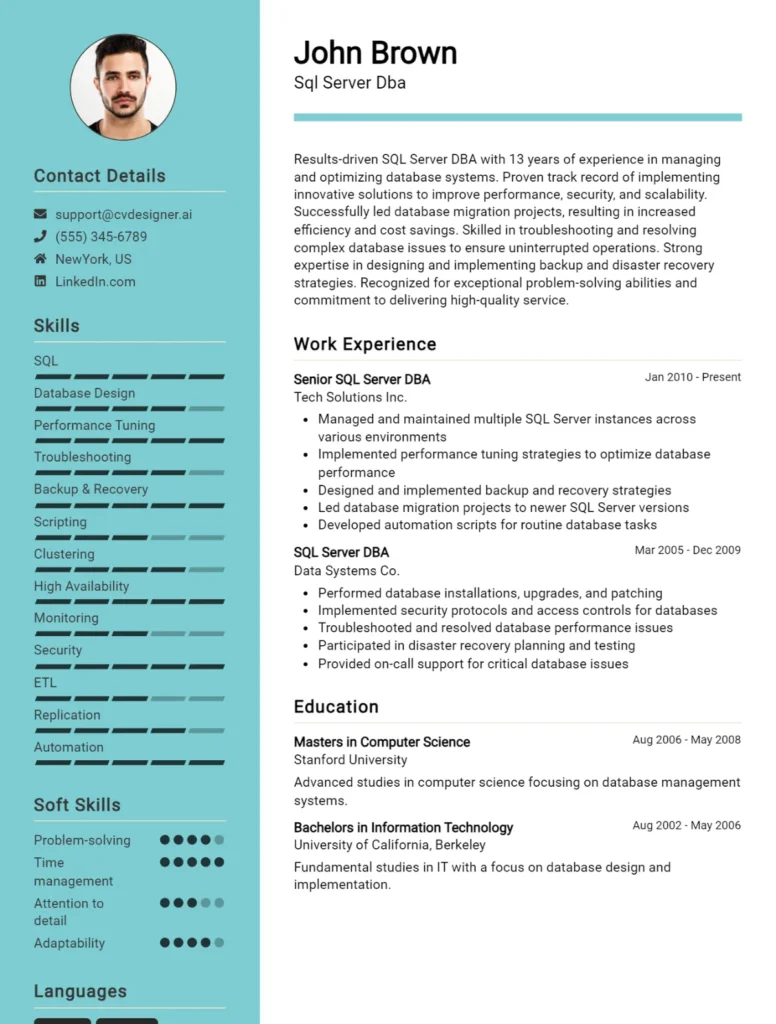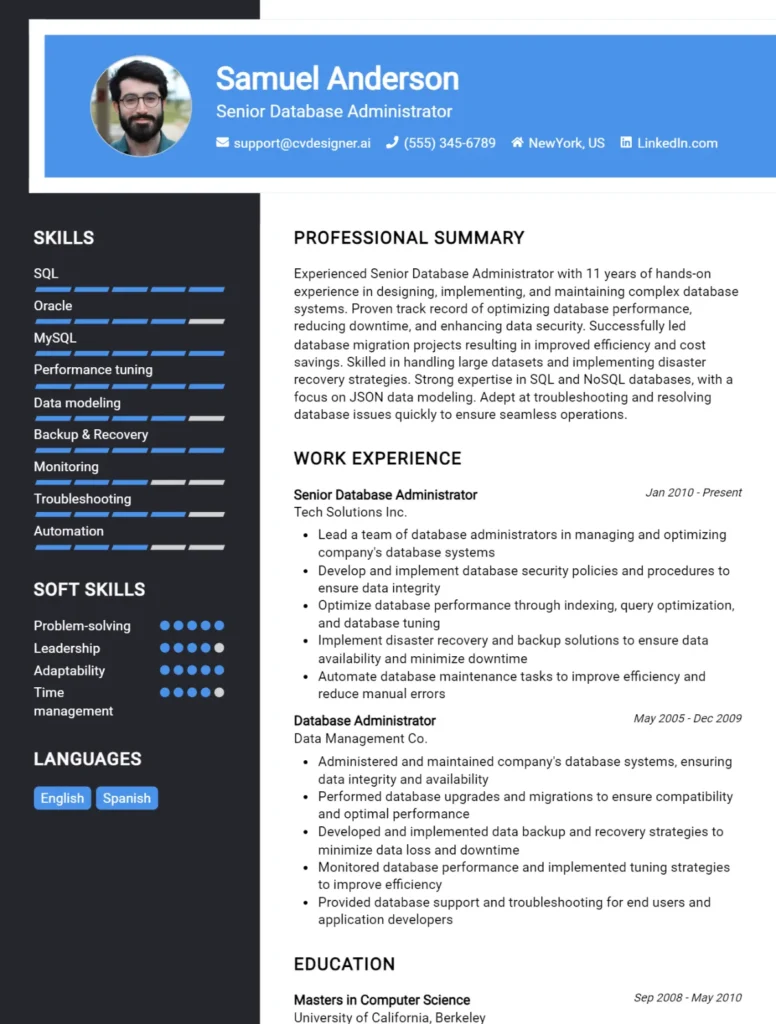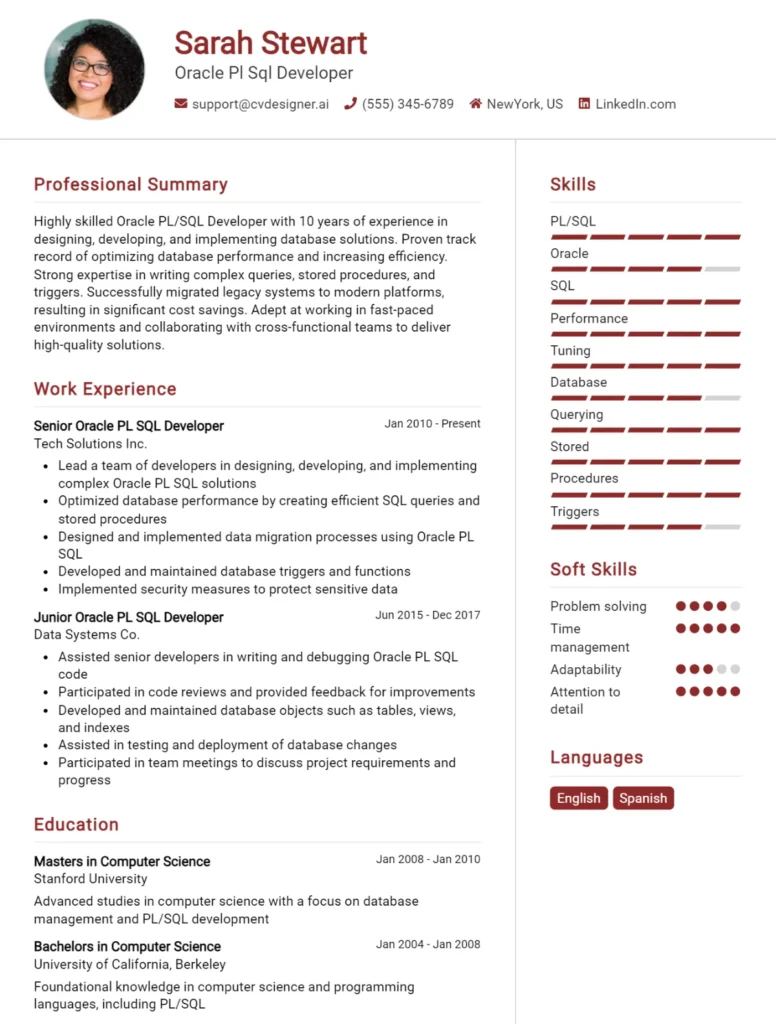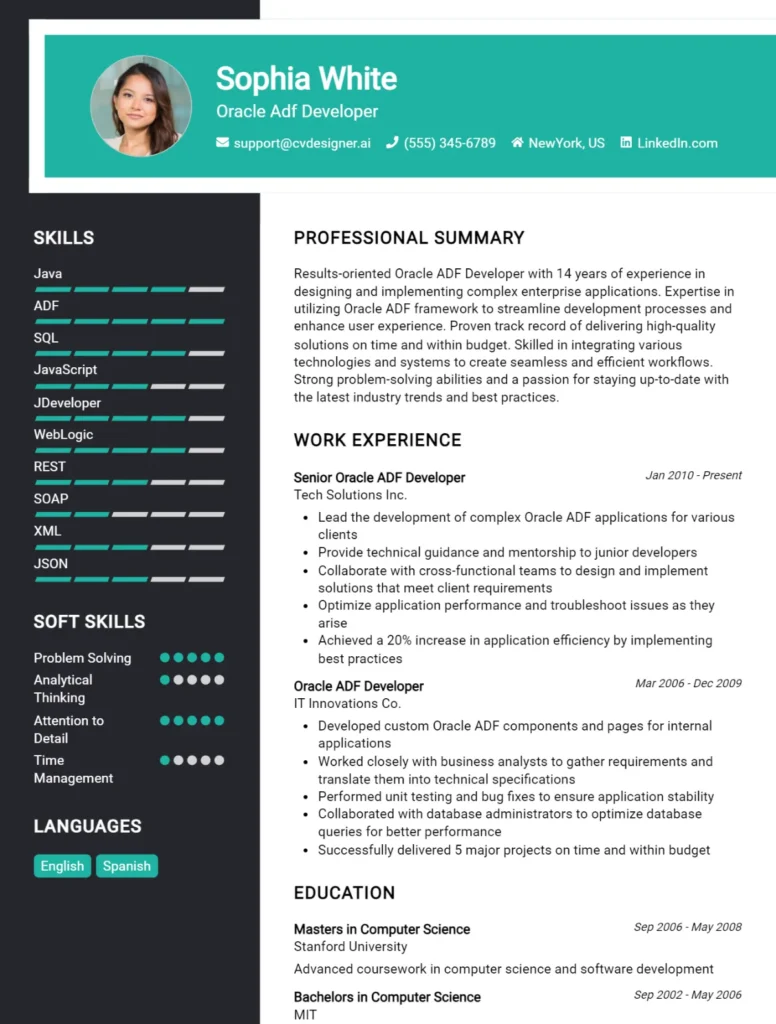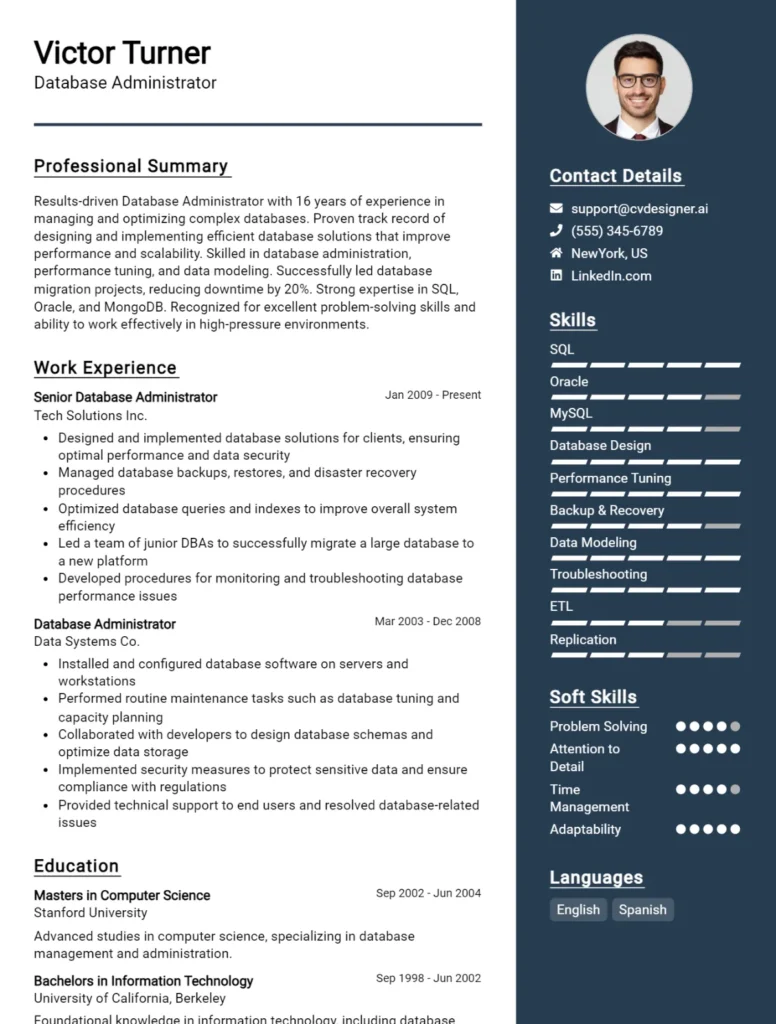Most Popular Database Programmer CV Examples
Explore additional Database Programmer CV samples and guides and see what works for your level of experience or role.
Are you ready to take your career as a Database Programmer to the next level? Crafting a standout CV is crucial in a competitive job market, and this guide will walk you through the essential elements of a successful Database Programmer CV. From showcasing your technical skills to highlighting relevant experience, we’ll cover everything you need to create a compelling application that grabs the attention of hiring managers. Here’s what you can expect to learn from this comprehensive guide:
- Key components of an effective Database Programmer CV
- Tips for tailoring your CV to specific job descriptions
- How to highlight your technical skills and programming languages
- Strategies for showcasing projects and relevant experience
- Insights on formatting and layout for maximum impact
- A detailed CV example tailored for a Database Programmer role
Dive in and learn how to present your qualifications in a way that sets you apart from the competition!
What is a Database Programmer CV?
A Database Programmer CV is a critical document that showcases a candidate's skills, experience, and qualifications tailored specifically for roles involving database management and programming. It highlights key competencies such as proficiency in SQL, database design, and optimization, as well as experience with relevant technologies like Oracle, MySQL, or PostgreSQL. A well-crafted CV not only details past job responsibilities and achievements but also demonstrates the programmer's problem-solving abilities and understanding of data structures. For tips on creating an effective CV, you can refer to this comprehensive cv writing guide.
The importance of a Database Programmer CV extends beyond merely listing qualifications; it serves as a marketing tool that presents the candidate in the best light to potential employers. A strong CV can differentiate a programmer in a competitive job market by emphasizing unique skills and successful projects that align with the needs of the organization. Additionally, utilizing a cv maker can streamline the process, allowing programmers to create professional and visually appealing CVs that capture attention and convey their technical expertise effectively.
Key Components of a Database Programmer CV
- Contact Information: Include your full name, phone number, email address, and LinkedIn profile or personal website if applicable.
- Professional Summary: A brief overview of your experience, skills, and what you aim to achieve in your next role as a Database Programmer.
- Technical Skills: List your relevant skills such as SQL, NoSQL, database design, data modeling, and other programming languages. For a comprehensive guide on skills, consider adding certifications and tools you are proficient in.
- Work Experience: Detail your previous employment, emphasizing roles related to database programming. Include your job title, company name, dates of employment, and a brief description of your responsibilities and achievements. For more information on showcasing your work experience, focus on quantifiable results.
- Education: Provide information about your academic background, including degrees earned, institutions attended, and graduation dates. Mention any relevant coursework or projects.
- Certifications: List any relevant certifications that demonstrate your expertise in database technologies, such as Oracle Certified Professional or Microsoft Certified: Azure Database Administrator Associate.
- Projects: Highlight significant database projects you have worked on, including your role, the technologies used, and the outcomes achieved.
- Professional Affiliations: Include memberships in relevant organizations such as the Association for Computing Machinery (ACM) or the International Society for Data Science.
- Soft Skills: Mention key soft skills that are crucial for a Database Programmer, such as problem-solving, attention to detail, and teamwork.
- Volunteer Experience: If applicable, include any volunteer work related to database management or programming, showcasing your commitment to the field.
- Awards and Honors: List any relevant awards or recognitions you have received throughout your career or education that demonstrate your expertise and dedication.
- References: State that references are available upon request, or include them if you have permission from your referees.
Sample Database Programmer CV for Inspiration
[Your Name]
[Your Address]
[City, State, Zip Code]
[Your Phone Number]
[Your Email Address]
[LinkedIn Profile URL]
Professional Summary
Detail-oriented and analytical Database Programmer with over 5 years of experience in designing, implementing, and maintaining database systems. Proficient in SQL, PL/SQL, and database management, with a strong focus on optimizing performance and ensuring data integrity. Proven ability to collaborate with cross-functional teams to deliver robust database solutions that meet business needs. Seeking to leverage expertise in a challenging new role to contribute to innovative database projects.
Work Experience
Database Programmer
ABC Tech Solutions, City, State
June 2019 – Present
- Developed and maintained complex SQL queries and stored procedures for data retrieval, manipulation, and reporting.
- Collaborated with software developers to integrate database functionalities with applications, enhancing user experience and system performance.
- Conducted performance tuning and optimization of existing databases, resulting in a 30% increase in query efficiency.
- Implemented data security measures and backup strategies, ensuring data integrity and compliance with industry standards.
- Assisted in the migration of legacy systems to modern database solutions, improving system reliability and performance.
Junior Database Developer
XYZ Innovations, City, State
January 2017 – May 2019
- Supported the design and development of relational databases, ensuring scalability and efficiency.
- Wrote and optimized SQL scripts for data extraction, transformation, and loading (ETL) processes, improving data analysis capabilities.
- Participated in troubleshooting database issues and implemented solutions that reduced downtime by 15%.
- Collaborated with business analysts to gather requirements and translate them into technical specifications for database design.
Education
Bachelor of Science in Computer Science
University of Technology, City, State
Graduated: May 2016
Skills
- Proficient in SQL, PL/SQL, and T-SQL
- Experience with database management systems such as Oracle, MySQL, and Microsoft SQL Server
- Knowledge of data modeling, normalization, and database design principles
- Strong analytical and problem-solving skills
- Familiarity with data warehousing and ETL processes
- Excellent communication and teamwork abilities
Publications
- "Optimizing SQL Queries for Better Performance" – Journal of Database Management, Vol. 12, Issue 3, 2022.
- "Data Integrity and Security in Modern Database Systems" – Proceedings of the International Conference on Database Technology, 2021.
Certifications
- Oracle Certified Professional (OCP) – Oracle Database 12c
- Microsoft Certified: Azure Database Administrator Associate
- IBM Certified Database Administrator – DB2
References
Available upon request.
Database Programmer CV Writing Tips
When crafting a CV as a Database Programmer, it's essential to highlight both your technical expertise and relevant experience in a clear and structured manner. Start by providing a concise summary of your qualifications, focusing on your proficiency in database management systems, programming languages, and data modeling. Tailor your CV to the specific job description, demonstrating how your skills align with the company's needs. Use quantifiable achievements to showcase your contributions and impact in previous roles. Additionally, ensure that your CV is easy to read, free of jargon, and visually appealing to create a positive first impression.
CV Writing Tips for Database Programmers:
- Tailor Your CV: Customize your CV for each job application by incorporating keywords and phrases from the job description.
- Highlight Technical Skills: Clearly list your technical competencies, including database technologies (e.g., SQL, NoSQL), programming languages (e.g., Python, Java), and tools (e.g., Oracle, MySQL).
- Showcase Projects: Include specific projects you have worked on, detailing your role, the technologies used, and the outcomes achieved.
- Quantify Achievements: Use metrics to demonstrate your impact, such as performance improvements, cost savings, or successful project completions.
- Include Certifications: If you have relevant certifications (e.g., Microsoft Certified: Azure Database Administrator), be sure to list them prominently.
- Professional Summary: Start with a strong professional summary that encapsulates your experience, expertise, and career goals in database programming.
- Focus on Problem-Solving: Highlight your ability to troubleshoot and solve database-related issues, illustrating your analytical skills.
- Keep it Concise: Aim for a CV length of one to two pages, ensuring that every section is relevant and contributes to your overall narrative.
Database Programmer CV Summary Examples
As a Database Programmer, your CV summary should concisely highlight your skills, experience, and value to potential employers. Here are several effective examples that demonstrate various strengths and qualifications in the field:
“Detail-oriented Database Programmer with over 5 years of experience in designing, implementing, and optimizing database systems. Proficient in SQL, PostgreSQL, and Oracle, with a strong focus on data integrity and performance efficiency. Committed to delivering high-quality solutions tailored to client needs.”
“Results-driven Database Programmer with a passion for data management and analysis. Experienced in developing complex queries and stored procedures to enhance data retrieval processes. Adept at collaborating with cross-functional teams to ensure seamless integration of databases with existing applications.”
“Skilled Database Programmer with a track record of successfully managing large-scale database projects from conception to deployment. Possesses expertise in database security, backup strategies, and disaster recovery planning. Known for excellent problem-solving abilities and a strong analytical mindset.”
“Dynamic Database Programmer specializing in cloud-based database solutions and data warehousing. Proven ability to optimize database performance through indexing and partitioning strategies. Strong background in data migration and ETL processes, with a commitment to continuous learning and professional development.”
“Innovative Database Programmer with extensive experience in creating and maintaining relational databases. Proficient in multiple programming languages, including Python and Java, alongside SQL. Recognized for developing user-friendly interfaces and documentation that enhance user experience and promote efficient data handling.”
Build a Strong Experience Section for Your Database Programmer CV
As a Database Programmer, showcasing your relevant work experience is crucial to demonstrate your technical skills and problem-solving abilities. Below are examples of work experience descriptions that highlight various responsibilities and achievements, helping you stand out to potential employers.
- Developed and optimized SQL queries for a large-scale e-commerce platform, resulting in a 30% improvement in data retrieval times and a smoother user experience across the website.
- Designed and implemented a robust database schema for a healthcare application, ensuring data integrity and compliance with HIPAA regulations, which enhanced the security of sensitive patient information.
- Collaborated with software development teams to integrate database management systems into web applications, successfully reducing data processing time by 25% through effective indexing and query optimization strategies.
- Conducted thorough database performance tuning and troubleshooting, identifying bottlenecks and implementing solutions that increased overall server performance by 40%.
- Managed database migration projects from legacy systems to modern relational databases, ensuring seamless data transfer and minimal downtime, which improved operational efficiency for multiple departments.
- Created and maintained comprehensive documentation of database structures, data flow diagrams, and coding standards, facilitating knowledge sharing and onboarding of new team members.
- Developed automated backup and recovery scripts to safeguard against data loss, significantly improving disaster recovery times and ensuring business continuity.
- Participated in code reviews and provided mentorship to junior developers, enhancing team skills and promoting best practices in database programming and management.
Database Programmer CV Education Examples
A solid educational background is essential for a Database Programmer, as it provides the foundational knowledge and technical skills necessary to excel in the field. Below are examples of relevant educational qualifications that can enhance a candidate's profile:
- Bachelor of Science in Computer Science
This degree focuses on programming, algorithms, and data structures, equipping students with the necessary skills to understand and manage databases effectively. - Bachelor of Science in Information Technology
Emphasizing the practical applications of technology, this program covers database management systems, networking, and software development, which are crucial for a Database Programmer. - Master of Science in Data Science
A more advanced degree that delves into data analysis, data mining, and machine learning, providing a strong analytical background to optimize database queries and performance. - Associate Degree in Database Management
This two-year program specifically targets the skills and knowledge required for database administration and programming, including SQL, data modeling, and database design. - Certification in Microsoft SQL Server
Specialized certifications demonstrate proficiency in specific database technologies and showcase a commitment to ongoing education, making candidates stand out in the job market.
Skills to Highlight in Your Database Programmer CV
As a Database Programmer, your role is crucial in designing, developing, and maintaining efficient database systems that support a variety of applications and services. Highlighting the right skills in your CV is essential to showcase your technical expertise and interpersonal abilities. Below is a curated list of soft and hard skills that can enhance your CV and make you stand out in this competitive field.
Soft Skills:
- Problem-solving: Ability to identify issues and implement effective solutions.
- Communication: Proficient in conveying technical information to non-technical stakeholders.
- Attention to detail: Ensures accuracy and precision in database design and data entry.
- Team collaboration: Works effectively with cross-functional teams to achieve project goals.
- Adaptability: Flexibility to learn new technologies and methodologies as needed.
- Time management: Efficiently prioritizes tasks to meet deadlines and project requirements.
- Critical thinking: Analyzes complex data to make informed decisions.
- Creativity: Approaches database design and optimization with innovative solutions.
- Conflict resolution: Manages disagreements within teams to maintain a positive work environment.
- Customer service orientation: Focuses on meeting the needs of users and stakeholders.
Hard Skills:
- SQL proficiency: Expertise in Structured Query Language for database management.
- Database design: Knowledge of data modeling and schema design principles.
- Database management systems (DBMS): Familiarity with Oracle, MySQL, SQL Server, PostgreSQL, etc.
- Data warehousing: Understanding of ETL processes and data integration techniques.
- Performance tuning: Skills in optimizing database performance and query execution.
- Backup and recovery: Knowledge of strategies for data protection and disaster recovery.
- Scripting languages: Proficiency in languages such as Python, Perl, or Shell for automation tasks.
- Version control systems: Experience with Git or similar tools for code management.
- Data security: Understanding of database security best practices and compliance requirements.
- Reporting tools: Familiarity with tools like Tableau, Power BI, or Crystal Reports for data visualization and reporting.
Database Programmer CV Format
As a Database Programmer, presenting your skills and experience effectively is crucial to landing your desired job. The right CV format can distinguish you from other candidates and highlight your technical expertise. Depending on your level of experience, different formats may serve you best. For entry-level positions, a chronological format that emphasizes education and relevant projects is ideal. For mid-level professionals, a combination format showcasing both technical skills and work history is recommended. Senior-level candidates should focus on a functional format that highlights leadership, strategic contributions, and key accomplishments.
- Use clear headings and sections to organize your CV for easy navigation.
- Start with a strong summary statement that encapsulates your key skills and experience.
- Include technical skills relevant to database programming, such as SQL, NoSQL, and database design.
- Highlight professional experience with quantifiable achievements to demonstrate your impact.
- Incorporate relevant certifications and training that enhance your qualifications.
- Customize your CV for each application, focusing on the skills and experiences that align with the job description.
For more details on choosing the right CV format, visit cv format.
Common Mistakes to Avoid in a Database Programmer CV
When crafting a CV as a Database Programmer, it's essential to present your skills and experiences in a clear and concise manner. A well-structured CV can set you apart in a competitive job market, while common pitfalls can detract from your qualifications. Avoiding these mistakes can help ensure that your CV effectively showcases your expertise and fits the expectations of potential employers.
- Neglecting to tailor your CV: Failing to customize your CV for each job application can result in missed opportunities, as employers look for specific skills and experiences that match their requirements.
- Overloading with jargon: While technical terms are important, excessive use of industry jargon can make your CV difficult to read and may alienate non-technical hiring managers.
- Ignoring quantifiable achievements: Instead of simply listing responsibilities, focus on quantifiable accomplishments that demonstrate your impact, such as improved database performance or successful project completions.
- Poor formatting: A cluttered or overly complex layout can make your CV hard to navigate. Use clear headings, bullet points, and consistent fonts to enhance readability.
- Listing outdated technologies: Highlighting knowledge of obsolete technologies can signal to employers that you are not keeping pace with industry advancements. Focus on recent technologies and trends.
- Failing to include relevant certifications: Not mentioning relevant certifications or training can be a missed opportunity to showcase your qualifications and commitment to professional development.
- Omitting soft skills: Technical skills are crucial, but soft skills like communication, teamwork, and problem-solving are equally important. Ensure to highlight these attributes as well.
- Using a generic objective statement: A generic or vague objective statement can weaken your CV. Instead, use a specific summary that reflects your goals and what you can offer to the employer.
- Inconsistent employment history: Gaps in employment or inconsistencies in job titles and dates can raise red flags. Be transparent and provide explanations if necessary.
- Neglecting to proofread: Spelling and grammatical errors can undermine your professionalism and attention to detail. Always proofread your CV or have someone else review it before submission.
Key Takeaways for a Database Programmer CV
- Highlight your technical skills, emphasizing proficiency in SQL, PL/SQL, and database management systems like MySQL, Oracle, and PostgreSQL.
- Include relevant certifications, such as Microsoft Certified Database Administrator or Oracle Certified Professional, to validate your expertise.
- Detail your experience with database design, normalization, and data modeling to showcase your understanding of efficient data structures.
- Describe your proficiency in writing complex queries and stored procedures, illustrating your ability to optimize database performance.
- Emphasize experience with data backup and recovery strategies, demonstrating your ability to maintain data integrity and security.
- Mention any experience with performance tuning, indexing, and query optimization to highlight your problem-solving skills.
- Include involvement in collaborative projects, showcasing your ability to work with cross-functional teams and communicate technical concepts effectively.
- Tailor your CV to the job description, using relevant keywords to ensure compatibility with applicant tracking systems (ATS).
- Consider using professional cv templates to enhance the visual appeal of your CV.
- Utilize a cv builder for an easy and efficient way to format your CV and ensure all important details are included.
- Don’t forget to create a strong cover letter using cover letter templates that complements your CV and highlights your unique qualifications.
Build your CV in minutes
Use an AI-powered cv builder and have your cv done in 5 minutes. Just select your template and our software will guide you through the process.

